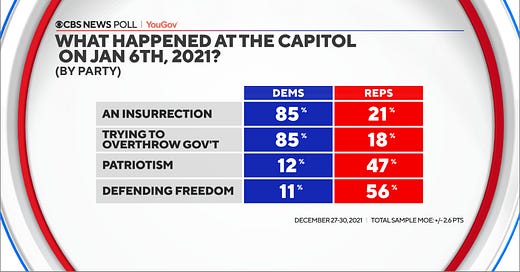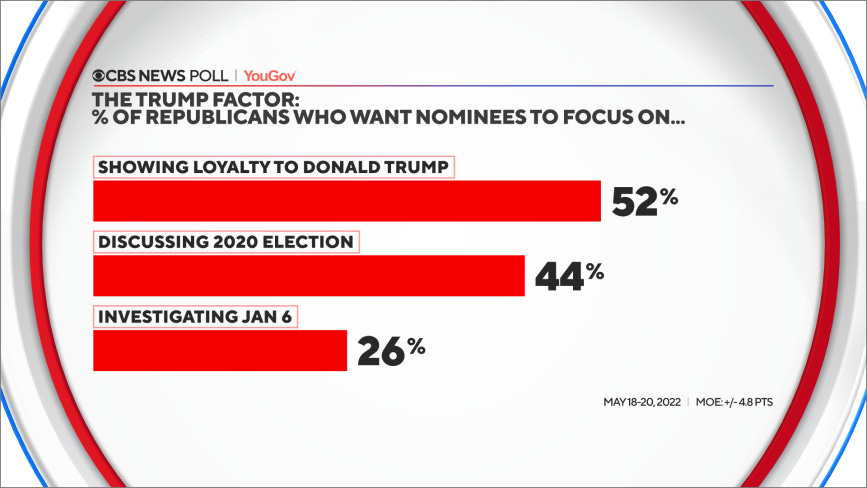January 6th: past and prologue | #199 – June 12, 2022
Partisans listen to their partisan opinion leaders. The GOP is doing little to nothing to stop another attack after 2022/2024.
One variable can predict how the vast majority of Americans feel about the riot at the US Capitol on January 6th, 2021: which party they vote for.
In a poll conducted in December 2021 by YouGov and CBS News on Friday, June 10th, 85% of Democrats responded to the question “What happened at the Capitol on January 6th, 2021?” with “an insurrection,” whereas only 21% of Republicans said the same. Over half (56%) of GOPers preferred instead to say the participants were “defending freedom,” and 47% said it was “patriotism.” Only one out of every 10 Democrats said the latter.
In another poll published by Reuters on Thursday, over half of Republicans said they believed left-wing protestors led the riot on January 6th. About two-thirds of them said the 2020 election was stolen by Trump.
The House Select Committee on the January 6 Attack is investigating what may have led to the events at the Capitol that day. Their first prime-time public display of evidence last Thursday— including testimony from one Capitol Police officer that she slipped in a poll of her colleague’s blood—was, in my opinion, very compelling. Another witness testified Donald Trump was willing to let his vice-president be hanged over losing an election he knew he lost. The job of the committee is to convince skeptical members of the public that Trump was, in fact, responsible for the events of that day—a claim that is plainly obvious to anyone who has opened their eyes.
One thing the committee cannot do is think about how to prevent another attempted coup in the future. But that shouldn’t stop us from thinking about it. Take two assumptions: (1) Partisans follow the cues of their party leaders. That is plainly evident from the first chart in this newsletter. And assumption (2): Donald Trump is responsible for the insurrection on January 6th, 2021.
The solution, then, is for Republican party leaders to speak out against the violence and reel their party back in. It will take many of them to reach a critical mass of influence. But there is progress. Today, Arkansas governor Asa Hutchinson, a Republican, said on Fox News Sunday that Trump is “politically, morally responsible” for the events of January 6 and that “Republicans need to do a lot of soul-searching as to what is the right thing here and what is the right thing for our democracy in the future, and not simply adhere to the basic instincts of some of our base.”
A more recent YouGov poll for CBS News found that 52% of Republicans want their party’s nominees to focus on “showing loyalty to Donald Trump” and 44% want them “discussing the 2020 election.”
On the one hand, that is a sign that the right’s coalition is fundamentally devoted to the same two principles, Trumpism and electoral illiberalism, that motivated the January 6 attack in the first place.
But the hopeful part of me also must note that the statistic means nearly half of Republicans aren’t. They might be persuaded by more rational members of the party’s leadership and their social group. There is a way off the cliff.
You probably don't get January 6th without the Electoral College
One more thing.
Kate Shaw, a law school professor, has a great review of Jesse Wegman’s 2020 book out in The Atlantic this week. I really think you should read it. Shaw makes a compelling case against the Electoral College, showing that while it is technically a process of decentralization, when faced with an authoritarian faction across multiple states and levels of government, the archaic institution actually magnifies risk (instead of minimizing it).
Posts for subscribers
If you enjoyed this post please share it — and consider a paid subscription to read additional pieces on politics, public opinion, and democracy.
You can read more about the benefits of a paid subscription at the newsletter’s online about page.
Biweekly mailbag/Q&A!
This is a reminder that I will be sending out the discussion from our first newsletter mailbag/AMA/Q&A on Tuesday, June 14th. Go here for more details and be sure to send in a question (or even just a comment)!
Get in touch
That’s it for this week. Thanks very much for reading. If you have any feedback, you can reach me at this address (or just respond directly to this email if you’re reading in your inbox). And if you’ve read this far please consider a paid subscription to support the blog.







Hi Elliott,
I certainly believe that we wouldn't have problems if we didn't have the Electoral College. The fact is getting rid of the Electoral College and making more democratic reforms is very very unlikely, given how hard is to amend the Constitution. I know people think the January 6th hearings are important (they are), but will it truly move the needle? Reforming the Electoral Count Act is very important, but that may not be enough. I'm not sure if we can do enough to prevent another January 6th from happening, what matters is what conservatives/Republican voters decide to do.
I hope you are well,
Elliot